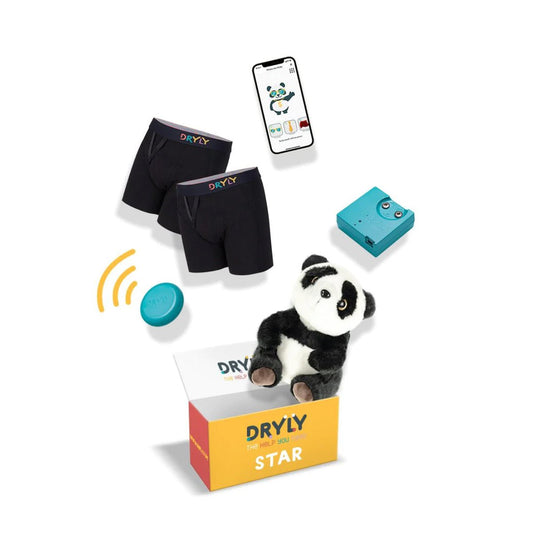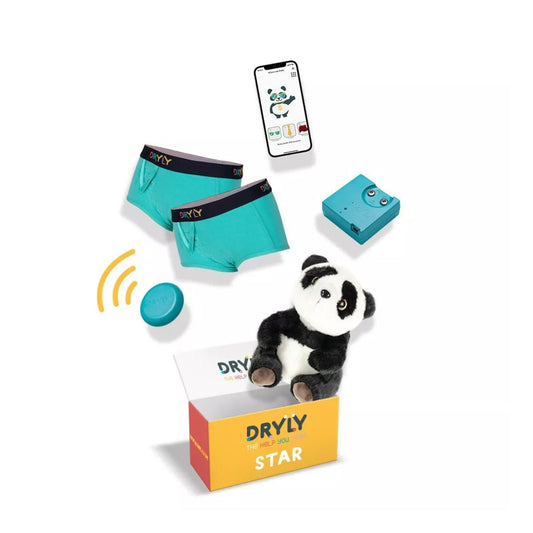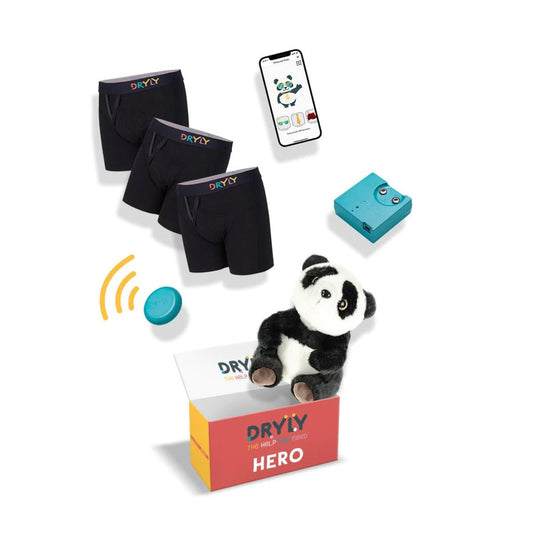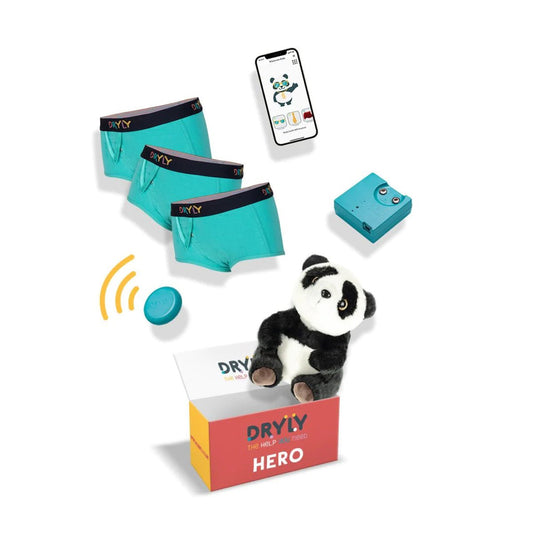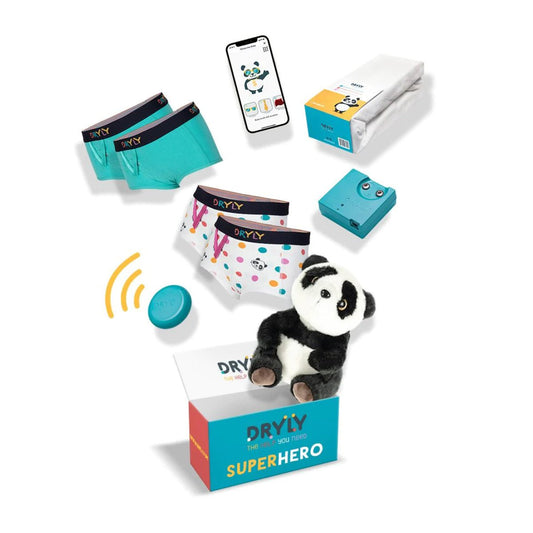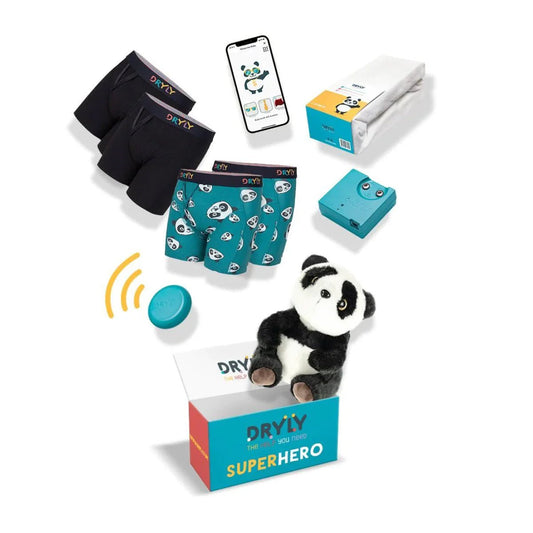Enuresis Nocturna
Enuresis nocturna is a medical term used to describe involuntary urine leakage, also called bedwetting when it happens at night. Enuresis can occur in children and adults, although it is most common in children under the age of seven. In children, it is a normal part of development, but if bedwetting continues to occur as a child gets older, enuresis may be present. This can be frustrating for both children and parents, but fortunately there are solutions and treatments available to address this problem.

What causes enuresis nocturna?
There are several causes of enuresis nocturna, and it is often a combination of factors. One of the most common causes is a delay in the development of the nervous system, meaning a child may not recognize the signals of a full bladder in time. Other possible causes include an overactive bladder, hereditary factors, or a sleep that is too deep for the child to wake up to the signal that he or she needs to go to the toilet. Hormonal factors, such as a deficiency of antidiuretic hormone (ADH), may also contribute to the problem.
Different types of enuresis nocturna
There are two main types of enuresis: primary and secondary enuresis.
- Primary enuresis: This means the child has never been dry for extended periods during the night. It is more common in younger children and is usually a sign of delayed development.
- Secondary enuresis: This occurs when a child or adult begins bedwetting again after an extended period of toilet training. Secondary enuresis can be caused by emotional stress, medical conditions, or changes in the environment.
Enuresis nocturna: nocturnal bedwetting
Enuresis nocturna, also called nocturnal enuresis, is the most common form of enuresis. Children with enuresis nocturna have difficulty controlling their bladder at night. This is often because they are in a deep sleep and do not notice the signal of a full bladder. It is important to know that nighttime bedwetting has nothing to do with laziness or a lack of discipline. In many cases, a child will grow out of it on their own, but some children and families may require additional support and treatment.

Enuresis Diurna
In addition to Enuresis Nocturna, there is also Enuresis Diurna. This is the involuntary loss of urine in children old enough to be potty trained. In other term, it is also called daytime incontinence. This form of incontinence can have several causes such as an overactive bladder, attention problems, or procrastination where children delay urination.
Sometimes stress or emotional stress can play a role in this. Enuresis Diurna is more common in girls than boys and can have a significant impact on a child's self-confidence. Timely diagnosis and counseling, often by a urotherapist or pediatrician are important to address the problem in an effective and child-friendly manner.
Treatments for enuresis nocturna
There are several treatments available for enuresis, depending on the age of the child and the severity of the problem. One of the most effective methods is the use of a bedwetting alarm, which wakes the child as soon as the first drops of urine are detected. This helps train the brain to notice signals from the bladder. Other treatments may include medication, such as desmopressin, which helps reduce urine production at night. In some cases, behavioral therapy, in which children are rewarded for dry nights, can also be effective.
The role of heredity in enuresis nocturna
Enuresis can be hereditary. Research shows that children whose parents themselves suffered from bedwetting are more likely to also develop enuresis. If both parents bed-wettered as children, the chance of their child having the same problem is about 75%. This suggests that genetics may play an important role in the development of enuresis. Still, it is important to remember that each child is unique and that bedwetting does not automatically mean a long-term problem.
Enuresis and emotional impact
Bedwetting can not only be physically annoying, but also have an emotional impact on both the child and the parents. Children may feel embarrassed or insecure about bedwetting, especially as they get older. This can lead to frustration, anger or avoidance of social activities such as sleepovers. For parents, dealing with enuresis nocturna can also be stressful, especially if they don't know how to best support their child. Open communication, patience and avoiding punishment or embarrassment are crucial in helping a child with enuresis.
What can you do as a parent with enuresis nocturna?
As a parent, it is important to remain calm and supportive when your child suffers from enuresis. Never punish your child for bedwetting, as this can make the problem worse. Make sure your child feels safe and understood. Talk to your child about what is happening and explain that bedwetting is something many children deal with. It may also be helpful to use a bedwetting alarm or help your child by going to the bathroom before bedtime. Patience and consistency are the key to success.
When should you consult a doctor?
In many cases, a child grows over enuresis on his or her own, but in some situations it is wise to seek medical attention. If your child continues to wet the bed regularly after age seven or if secondary enuresis is present, it is advisable to contact a doctor. A doctor can examine for underlying medical causes, such as a urinary tract infection or bladder problems, and suggest appropriate treatment. Professional help may also be necessary if enuresis is causing emotional problems.
The importance of a good night's sleep for enuresis
Although enuresis nocturna can be a disruption to sleep, it is important to make sure your child gets enough sleep. A good night's sleep contributes to overall health and can help the body recover more quickly from bedwetting. Try to create a restful bedtime routine and avoid giving your child too many fluids right before bedtime. By focusing on a healthy sleep environment, you can minimize the impact of enuresis on your child's sleep.
Dealing with enuresis
Enuresis, or bedwetting, is a common problem in children that often goes away on its own as they get older. As a parent, it is important to remain patient and support your child during this process. There are several effective treatments available, such as bedwetters and medication, that can help reduce bedwetting. Remember that bedwetting has nothing to do with willpower or laziness, but is often the result of a developmental delay. By working with your child and possibly consulting a doctor, you can take the right steps to effectively treat enuresis.
The most innovative bedwetting alarm
Science shows that this is one of the most effective ways to get rid of Enuresis Nocturna. Several studies show a 70% to 93% percent success rate in children between 5 and 12 years old using the bedwetting alarm.
The Dryly bedwetting alarm is designed in such a way that it turns an unpleasant subject like Enuresis Nocturna into a fun adventure with Wizzu the panda bear. This positive approach motivates your child and gets results faster.
When you receive the Dryly bedwetting alarm, it includes Wizzu the panda bear, underwear, a receiver and a transmitter. By the time your child goes to bed, they put on the bedwetting alarm underwear and start the bedtime ritual in the Dryly app. Part of this includes reading a book, going to the bathroom and unwinding. On the underwear, you attach the transmitter. This guards against an accident.
If your child starts peeing in bed while sleeping, the transmitter notices and sends a message to the receiver. The receiver plays a sound to wake up your child. It also sends a message to the bedwetting Alarm app on your smartphone. This allows you to properly support your child with urinating and changing the Dryly bedwetting alarm pants.
Through the bedwetting alarm method, the child learns to recognize the messages of a full bladder better and better because it is awakened each time it becomes "too much. We hear stories of parents who became dry in a matter of weeks, but we advise that you should count on a 2 to 3 month trajectory anyway.
Insurance and refunds
Did you know that there is a solution against Enuresis Nocturna that is reimbursable? What many people do not know is that the bedwetting alarm is reimbursed by many insurance companies. Depending on the health insurer and the package, this may be in whole or in part. Unfortunately, about 8% of health insurance companies do not cover the bedwetting alarm. Want to know if your insurance company will cover the bedwetting alarm? Take a quick look at our reimbursements page.
Best bedwetting alarm including app with playful elements
The alarm that sounds when you urinate ensures that children make the connection between a full bladder and having to go to the bathroom. Initially, the alarm will cause the child to be startled, wake up and tighten the sphincter of the bladder. The behavior is then learned during this period. When the bedwetting alarm is used for a few weeks, the child will make a connection between the alarm and a full bladder. By learning the behavior to go to the bathroom, when the bladder is full, the child will wake up and go to the bathroom by himself. This process is called classical conditioning.
With panda bear Wizzu as a new best friend, the adventure begins. Even in the mobile app, Wizzu is always nearby. Wizzu is always there for you and helps on your way to dry nights. You can even personalize Wizzu, save points for every dry night and exchange these points for a cool pair of sunglasses or a cute hat, for example.
Besides fun features, it also helps parents monitor bed-wetting behavior. For example, the app notifies you when bedwetting occurs and you can also track the progress. This allows you to see at a glance how the child is progressing.
The interactive mobile app, the panda toy Dryly®, the cool underwear and the operation are at the heart of the adventure.
Want to learn more about daytime wetting? Read about ‘Enuresis Diurna’ here.
Frequently asked questions causes of bedwetting
What are the most common causes of bedwetting?
Bedwetting is often caused by a combination of factors such as a small bladder, deep sleep, heredity and sometimes stress.
Consequently, these are the most common causes.
Can bedwetting occur without a clear cause?
Yes, in many children there is no obvious medical cause, it may have to do with bladder and nerve development.
Does heredity always play a role in bedwetting?
Not always, but children with history are more likely to have bedwetting.
-
Dryly® Bedwetting Alarm Star
Normal price 199.99Normal priceUnit Price / per255.95Offer price 199.99- Guidance via mobile app
- Underwear plain 2-pack
- Optional vibration function
- Wizzu (panda cuddly toy)
- Transmitter & receiver
Sale -
Dryly® Bedwetting Alarm Hero
Normal price 229.99Normal priceUnit Price / per278.94Offer price 229.99Most chosen- Guidance via mobile app
- Underwear plain 3-pack
- Optional vibration function
- Wizzu (panda cuddly toy)
- Transmitter & receiver
Sale -
Dryly® Bedwetting Alarm Superhero
Normal price 259.99Normal priceUnit Price / per325.92Offer price 259.99Best deal- Guidance via mobile app
- Extra mattress protector
- Underwear plain 2-pack
- Underwear print 2-pack
- Optional vibration function
- Wizzu (panda cuddly toy)
- Transmitter & receiver
Sale
Frequently asked questions toilet training at night
From what age do you start toilet training at night?
There is no set age at which to begin nighttime potty training. Each child develops at his or her own pace. A good time is when your child is potty trained during the day, and has motivation to work on this himself. This usually begins from the age of 5 years old.
What if my child continues to bedwash at night despite nighttime training?
If bedwetting persists longer, such as after age 6, there may be nocturnal enuresis. This is often not psychological, but physical in nature. A bedwetting alarm is an effective aid. When in doubt, you can always consult a doctor.
Does it help to drink less before sleeping?
Limiting fluid intake before bedtime can sometimes help, but it is important to do so in a healthy way. Give your child plenty to drink during the day, and avoid sugary drinks in the evening. Always make sure your child pees before bedtime!
Is the use of a bedwetting alarm effective?
Yes, pee alarms have been used effectively in nighttime potty training for decades. A bedwetting alarm helps children become aware of the sensation of a full bladder. This helps children gain a lot of confidence and speeds up the process considerably.
